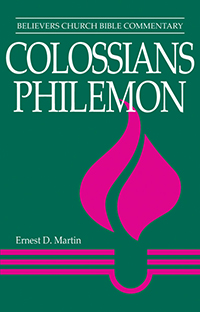Elements of the Universe (in Colossians and Philemon)
![]() Home A B C D E F G H I J K L M N O P Q R S T U V W X Y Z Abbreviations Glossary
Home A B C D E F G H I J K L M N O P Q R S T U V W X Y Z Abbreviations Glossary
This term, occurring in Col. 2:8 and 20, causes problems for interpreters and translators because the word stoicheia (elements) has no precise definition in the NT. In the literature of the Greek world of the first century, the "elements" were commonly understood to be the basic four: earth, water, air, fire (with a fifth sometimes added: ether). Eduard Schweizer argues that this basic definition underlies NT usage, and that asceticism (Col. 2:21) and worship of angels (2:18) were attempts to break free from the power of the elements (1988:455-468). Colossians asserts that Christ is the superior power, and in him believers die to the elements of the world and rise again to seek the things above.
Walter Wink's research indicates that in first-century usage, stoicheia meant the most basic components of any entity or thing; the meaning must be determined by the context. We use the word elements in a similar way in speaking of chemical elements, of the Lord's Supper, and of wind and rain as elements of nature. Wink notes four different meanings in the seven NT occurrences (1984:77):
The ABCs, the elementary or first principles of faith—Heb. 5:12; Gal. 4:9 (in part)
The constituent elements of the physical universe—2 Pet. 3:10, 12
The basic constituents of religious existence common to Jews and Gentiles alike (rituals, festivals, laws, beliefs)—Gal. 4:3, 9; Col. 2:20 The first elements or founding principles of the physical universe—Col. 2:8
In this analysis the meaning of elements is different in Col. 2:20 from what it is in 2:8. Wink observes that early Christian theologians (after the NT) also defined the elements differently in different contexts (1984:164-165).
This term is related to but not identical with "powers" in the NT. [Powers, p. 308.] The elements of the world/universe are neither political personalities nor spirit beings. But they are real and powerful. One meaning of the term arche* (translated ruler in 2:10) is first principle, and in that sense it is synonymous with element. The elements become idolatrous when people grant them an ultimacy they do not really have. As the shaping factor of physical, social, or religious existence, Christ is ultimate, not the elements of the universe. Wink comments on the modern choice of materialism in this way:
Paul's prescience in Col. 2:8 is remarkable; he somehow understood something that our age, with all its feats of knowledge and technology, has been unable to grasp: that the fascination with first things—the elements of the universe—would inevitably lead to idolatry and to a subtle but insidious slavery to matter. The moment we declared these principles ultimate, we elevated them in value above ourselves. Having projected ultimacy onto matter, we could only bow before it. For whatever is ascribed ultimacy functions as a god, whether its devotees would describe it thus or not. And the preferential selection of matter as the ultimate reality of the universe, as its fundamental constituent and determining factor, meant that the entire spiritual dimension of reality was ruled illusory from the outset (1986:137).
| —Ernest D. Martin |
